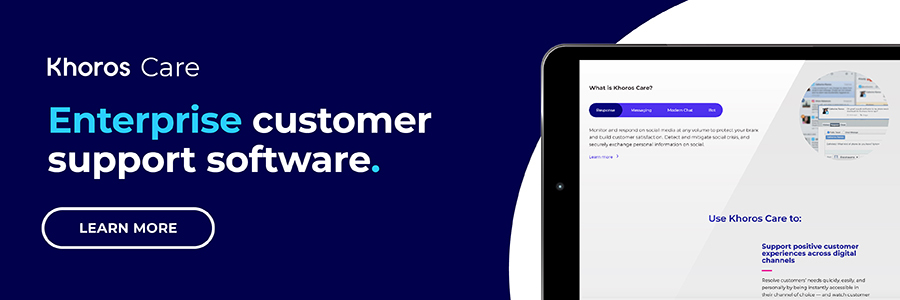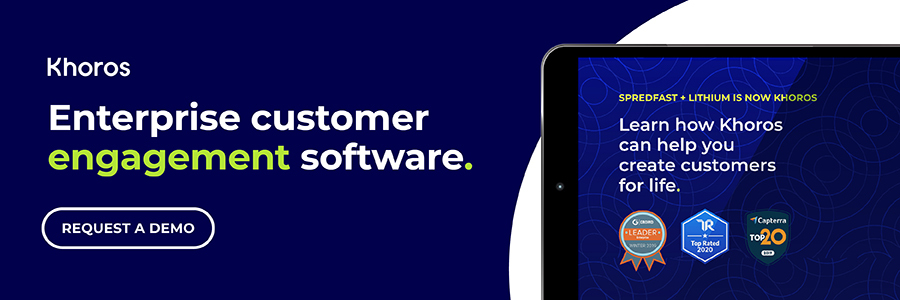 Logo
Logo
EXPERT INSIGHTS
Nov-25-2020
To outsource customer service or not? Three benefits and three potential challenges
Khoros Staff
Customer care is never easy, and the past year has only made it harder. As customer needs and inquiry levels rise, brands must weigh different options to meet the demand.
One of those options is to outsource customer service, either partially or fully. If your brand has been kicking this idea around, you’re not alone. With contact centers constantly being challenged to cut costs, while also continuing to provide exemplary service, the benefits of business process outsourcers (BPOs) can be appealing.
But your contact center is the front line and the voice of your brand. That doesn’t necessarily mean you should never outsource customer service, but it does mean that it’s critical to understand the pros and cons.
Three benefits of customer service outsourcing
Understanding the key benefits of shifting care efforts to a BPO, whether that be for after hours support or full support of a specific channel, should be the first step before vetting potential partners. Here are the three most important benefits.
1. No need for additional full-time employees or agents
One of the most common concerns we hear from Khoros Care customers is, “how do I increase the capacity of my agents, without hiring more people or risking agent burnout?”
Great question.
A digital-first contact center solution, such as Khoros Care, is the best way to keep customer service in-house while significantly improving agent capacity. However, customer service outsourcing will add additional agents, without the additional labor costs and overhead associated with benefits and office space.
2. Global coverage and talent
It's no surprise, but consumer and customer expectations have changed. They want 24/7 support on their channel of choice. But figuring out around the clock staffing in-region can often prove not only expensive but challenging. Working with a BPO partner can open up your brand to resources in key markets and time zones, many of whom have specialized training and industry experience at the ready.
3. Cost Savings
We saved the most obvious benefit of partnering with a BPO for last: you can save your contact center some money. And while CSAT and CX should always be a primary goal, budget constraints are always important considerations. While it’s true that partnering with a BPO can help reduce labor costs, it is also vitally important to work closely with your chosen partner, to ensure that things like SLAs, brand voice, and customer experience are not hampered. Remember: sacrificing quality of customer service will also result in poor business outcomes, especially in the long term. Likewise, improving scores like CSAT and NPS can improve business outcomes.
Three potential challenges when brands outsource customer service
While there are benefits of partnering with a BPO, there can definitely be some challenges as well. Before engaging with a BPO partner, or if you are already working with one, it is important to consider these potential roadblocks and ensure proper alignment of teams. That way, you can minimize friction and protect your customers’ experience.
1. Governance and oversight
As we’ve already mentioned, your contact center is the front line of communication and engagement with your customers — one of the few chances you get to make a good impression on them. The stakes here couldn’t be any higher: As many as 96% of consumers say they’re willing to leave when they experience bad customer service. This can cost brands over $75 billion a year. In short, good customer service isn’t optional; it’s required.
These heightened stakes make your brand’s relationship with its BPO absolutely critical. Especially for companies that have spent years building their brand, handing over the keys to a third-party vendor with limited visibility into how they do customer care is a shaky proposition. Your brand must implement a governance structure to ensure that the BPO is following brand guidelines, responding with the right brand voice and tone, adhering to the same SLAs provided to internal care agents, and otherwise sticking to corporate guidelines for compliant digital use.
This process of governance is even more critical for brands in highly regulated industries like financial services and Healthcare, as well as in retail, where customers need to share personally identifiable information such as account numbers and billing information.
While it will always be more difficult to have oversight and governance for an external team than an internal one, there are still measures your brand can take. Using the right tool is critical in this situation. By having your BPO use the same customer care platform as your in-house care team, you can mitigate risk and gain valuable oversight into how all agents are engaging across a variety of channels. Standardizing on one care platform is a critical step in creating this governance structure, and should be mandated from the brand.
2. Data ownership
BPOs often have a set of technology tools that their agents typically use. In some ways, this is a good thing for the brands they contract with, as it can save them money. However, there’s always an important question that needs to be asked: “How much is your customer care data worth to you?”
When BPOs use their own technology platforms, brands typically have limited access to the wealth of data generated by daily care interactions. And these data cover a lot more than just agent performance. Care teams are tapped into the voice of the consumer. They understand the challenges, wants and needs of the customer, and those data are lost if there isn't close collaboration across teams. Digital-first platforms like Khoros Care offer brands data insights to influence not just care practices, but also marketing strategies, R&D, product design, and more. This is another reason that even if your brand outsources customer service, you should do so with a BPO that is willing to use the same Care solution as your internal support team. That way, even when customer service outsourcing, you’ll maintain ownership of your own precious data.
3. Quality and training
Quality control in an internal contact center is difficult enough in an internal contact center; with a BPO, it gets even harder. The BPO will need to be trained on your business to ensure that they are providing the right answers at the right time, and keeping customer experience consistent with what they would receive from your internal teams.
Here again, a tool like Khoros Care can help. The platform helps internal and external teams ensure that they are providing a consistent experience to the customer, while also preventing things like agent collision and providing comprehensive data to inform all parts of the business.
Outsourcing customer service: Worth the cost?
So, is customer service outsourcing the right move for your brand?
The real answer is that it depends. It’s often better from a customer experience perspective to keep everything internal, but that’s not feasible for some brands — especially those who need to provide support around the world or after business hours. What’s more, BPOs offer real savings, and the best ones make excellent partners; these are all great reasons to outsource customer service.
What’s more important is that whether or not your brand contracts with a BPO, you have the procedures, governance, and tools in place to take excellent care of your customers.
Learn more about Khoros Care, or schedule a demo to see what a digital-first platform can do for your contact center.













